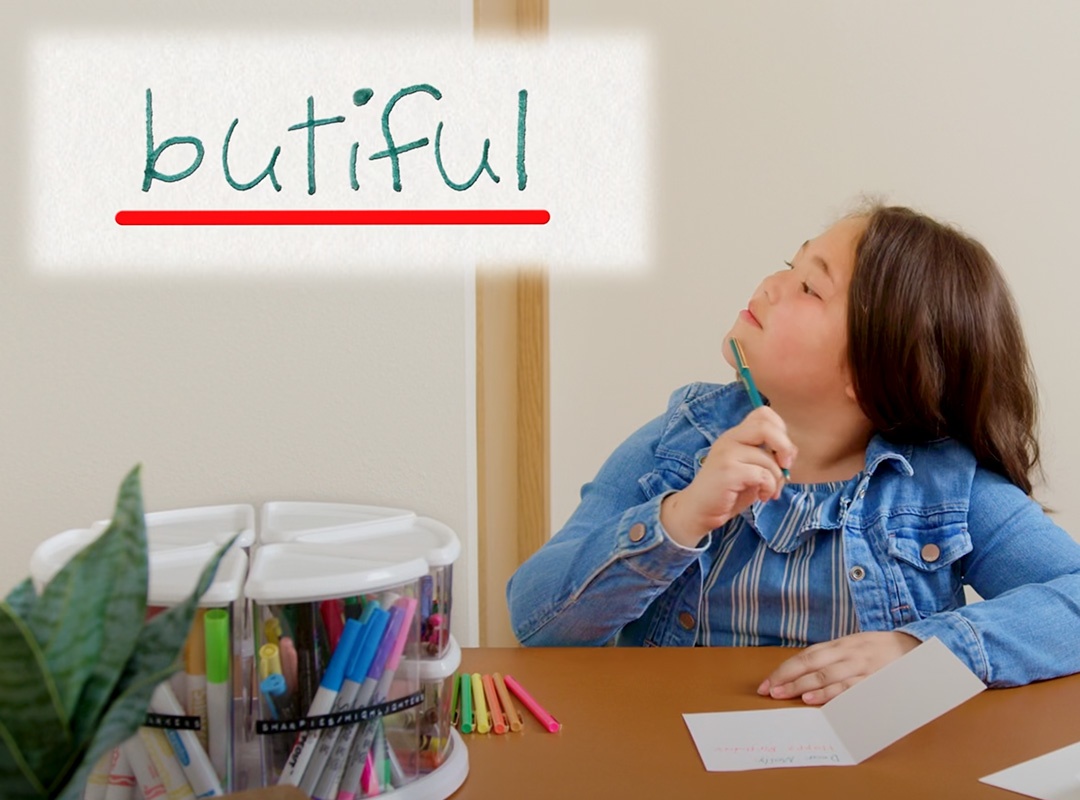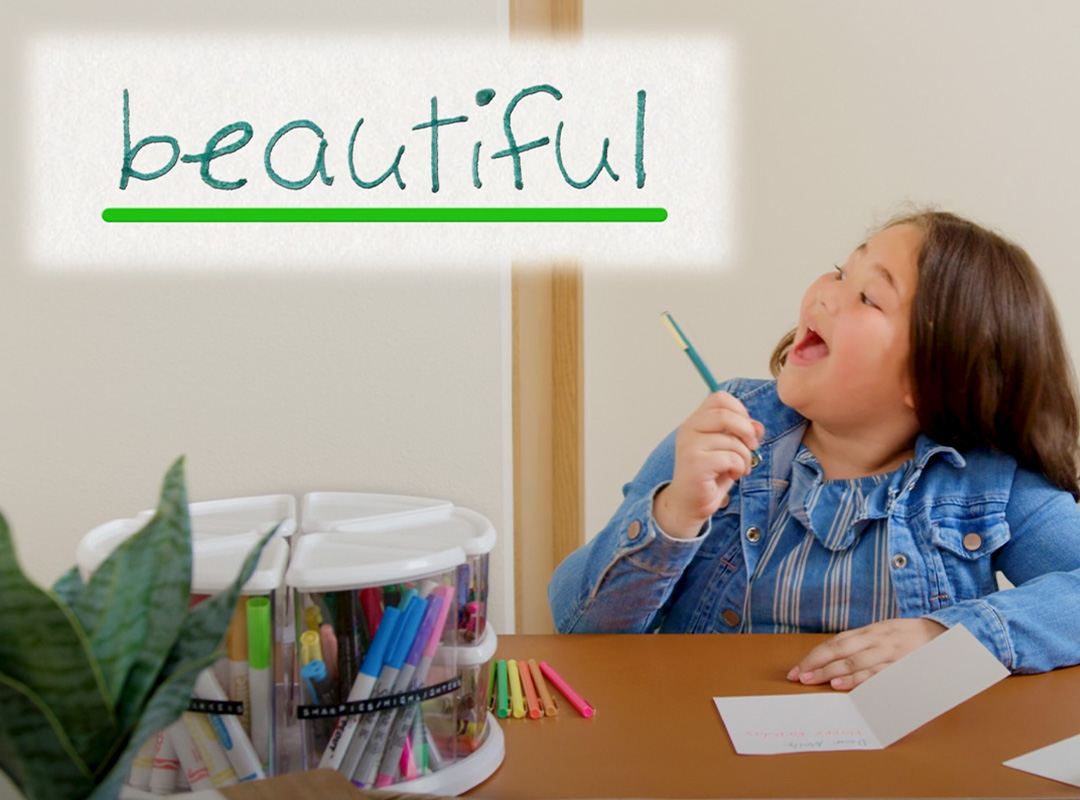In a World of Spellcheck, Why Spelling Matters
Before we discuss this LOL, auto- and spell-correcting world we live in, there is one thing we want to be sure you take away from this post:
There is no question that spelling matters to early learners. Learning the foundational elements of the language they will use for the rest of their lives is essential.
Whether from a book or on a phone, or from a magazine or on whatever new technology is to come, reading will always be integral to our lives. Although reading and spelling are different disciplines, considerable, consistent research clearly indicates that explicit and incremental spelling instruction is crucial for early learners to become proficient readers.
For more information about the similarities and differences between reading and spelling, visit our What’s the Difference Between AAR & AAS? blog post.
“But … Spellcheck!”

It’s usually when our early learners reach that peer pressure–filled elementary school age that the “Why do I have to learn spelling when there’s …” challenges begin.
If you have a preteen or older homeschooled student – or if perhaps you’ve wondered if battling with your teen over spelling is worth it – this article is for you.
Many articles have already been written about how spellcheck isn’t perfect and how over-reliance or dependence on these tools is having negative effects on long-term spelling ability. There are articles about spellcheck and autocorrect often having difficulty with homophones (for example, dear and deer) and plenty of stories about potential jobs lost because of spelling errors in resumes or in emails to bosses. All these points are true, but what really matters is the following:
Why Spelling Matters
Spelling ability affects reading ability.
Scientific studies show that spelling instruction is linked to improved reading fluency. As more patterns are automatically mapped together in the brain, reading speed increases and fluency improves.
Spelling ability affects reading comprehension.
As reading speed and fluency improve, your students’ minds are free to focus on reading comprehension – understanding what they’re reading. This transition from learning to read to reading to learn opens new doors to higher-level thinking.
Spelling ability affects writing ability.
When children no longer need to focus on spelling each word correctly and gain confidence in their spelling ability, the process of writing gets faster, easier, and more rewarding. An expanding vocabulary boosts self-esteem and encourages writing creativity and exploration.
Most importantly, spelling ability affects self-confidence.
However unfairly, a lower ability to spell properly or read fluently is often perceived as an indication of lower intelligence. For many children who struggle with spelling – due to neurological differences or poor early instruction, or for other reasons – this can be a debilitating lifelong sentence.
Helping your children become competent, confident spellers will have a positive impact on their self-perception, relationships, professional opportunities, and more. It’s a gift that keeps on giving.
Children build a feeling of personal mastery when learning new words and how to use them. As their knowledge and understanding of the rules of spelling grow, they begin to realize that these same rules empower them to spell almost any word they want to communicate.
Spelling instruction may seem “old school” to young learners, but science-driven research, combined with recent discoveries uncovering how our brains work, has shown that “old school” taught with new multisensory methods is best for mastering spelling and reading.

This generation of students has amazing new technologies at their disposal that facilitate everyday life. Spellcheck, autocorrect, grammar apps, and audio pronunciations are useful tools that can help us in many ways – and who knows what AI will bring?
The bottom line is this: there is no substitute or shortcut for learning how to spell and read proficiently. For learning to last a lifetime, it takes incremental instruction taught explicitly using multisensory teaching methods. Add in as much practice and review as required until mastery, and you have the bear ingredients needed to be a successful speller and reader for life.
(… “Bear” ingredients?!!! It was supposed to be “bare” ingredients! Arghh! Spellcheck fails again!)
To learn more about how we help you teach reading and spelling to your homeschooled or tutored student – and for free teaching tips and activities – please visit the links below:







Sarah Dixon
says:This post is exactly what my older student needs. Thanks!
Robin
says: Customer ServiceYou’re welcome, Sarah!
Amanda
says:Looking forward to trying AAS.
Robin
says: Customer ServiceJessica,
Let me know if you have any questions or need help with placement or anything. I’m happy to help!
Marjorie Goertzen
says:What a well-articulated post! Having covered all seven levels of All about Spelling with our grandson, I find that the conciseness with which the rules are presented makes them easy to remember. The English language isn’t just a mass of exceptions; as Lesli said, there is order. Remembering the rules and exploring the etymology of words is helping our grandson reason his way through new spelling challenges. I can hardly thank you enough for the AAS approach.
Robin
says: Customer ServiceThank you, Marjorie! It’s wonderful to hear how All About Spelling has helped your grandson!
Lesli
says:I wish I learned all these rules growing up. They give a little bit of order to chaos!
Robin
says: Customer ServiceLesli,
I agree! I have only learned in teaching my own children that English is far more logical and orderly than what I was taught.
Jessica
says:We previously used Spelling U See for our spelling curriculum, but I’m excited to try AAS for my daughter who has dyslexia!
Robin
says: Customer ServiceI love your enthusiasm about All About Spelling, Jessica! Let me know if I can help you with anything.
Carrie
says:This is great, thank you for this post!
Robin
says: Customer ServiceThank you, Carrie!
Liz
says:Yes, this is such a great reminder of the importance of spelling! Excited to start the AAS program with my kids.
Robin
says: Customer ServiceThank you, Liz!
Blake
says:So excited to start all about spelling.
Lis
says:So true! For the longest time google docs was actively suggesting the *wrong* homophone because it was pulling from popular use.
Robin
says: Customer ServiceLis,
Now I want to know what the homophone was that Google Docs kept suggesting! How interesting!
Lis
says:So true!
Lori Blake
says:Absolutely! I never rely in spell check.
Sarah
says:I really like how colorful this is! Yes spelling matters!!
Robin
says: Customer ServiceThank you, Sarah!
K P
says:Very needful post!
Robin
says: Customer ServiceThank you!
Lisa Williams
says:This is why I’m excited to start this curriculum. I wish I would of found it earlier.
Krystina
says:Agree, spelling is so important. Excited to learn more about how I can help my first grader master this subject!
Robin
says: Customer ServiceKristina,
I’m happy to help! What questions or concerns to you have?
Mrs Jarr
says:This! This is why we switched to all about learning. It has to be learned and it has to be fun.
Robin
says: Customer ServiceThank you! We love making learning fun and engaging!
JESSICA L WENGER
says:haha!! I see what you did there! “Bear . . . .Bare . . . .” I saw it right away and couldn’t believe there was a mistake . . . .’til I saw the punchline! LOL :) Good one! :)
Robin
says: Customer ServiceJessica,
Great catch!
Beth
says:Excellent article!
Robin
says: Customer ServiceThank you, Beth!